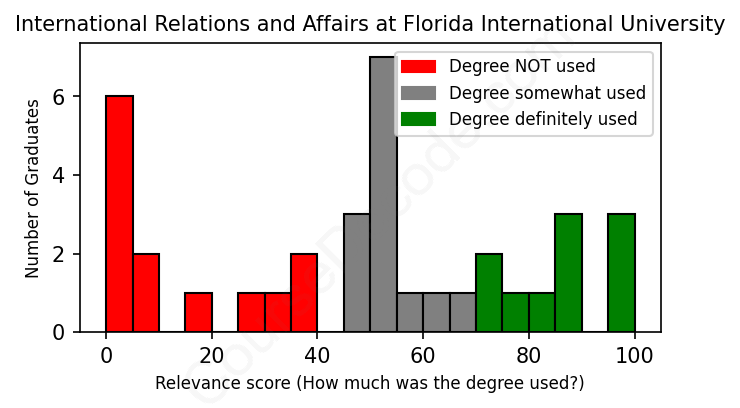
First, some facts. Of the International Relations and Affairs graduates from Florida International University we've analyzed , here's how many have used (or NOT used) their degree in their career:

These are estimates based on AI analysis of 36 LinkedIn profiles (see below).
The verdict? Significantly below average. Overall, with an average relevance score of 47%, International Relations and Affairs graduates from Florida International University have a much lower likelihood (-20%) of finding work in this field compared to the average graduate across all fields:
And for comparison, here's the chart for all profiles we've looked at across all degrees.
Also, after graduating, 36% of these graduates have pursued further education other than another Bachelor's degree (such as a Masters degree or other), compared to the average across all profiles of 35%. This suggests you may need more than just a Bachelors degree to be competitive as a International Relations and Affairs graduate.
See the details:
|
Relevance score: 59% We think this person has gone into a career only somewhat relevant to their degree. We think this person has gone into a career only somewhat relevant to their degree.
DEGREE INFOGraduated in 2015 from Florida International University with a Bachelors Degree in International Relations and Affairs. Also pursued further education since (see below). JOB HISTORY SINCE GRADUATIONProgram Assistant, LIU GEAR UP LIU Brooklyn Aug 2016 - Jan 2017 Adjunct Professor  LIU Brooklyn Sep 2016 - Jun 2018 Program Coordinator, LIU GEAR UP  LIU Brooklyn Jan 2017 - Jun 2018 Financial Aid Specialist  Workforce Solutions Nov 2018 - Aug 2021 Spanish Teachder  Fort Bend ISD Jan 2022 - 2024 FURTHER DEGREES DONE SINCE GRADUATINGM.Ed. in Curriculum & Instruction, English as a Second Language TESOLUniversity of Houston-Victoria 2020 - 2021 ABOUTHighly resourceful and enthusiastic professional with an ample amount of Knowledge regarding administrative and office procedures working in the education industry. I have built my expertise as a knowledgeable and experienced professional with excellent communication skills, unique ability to provide exemplary customer service, and the ability to work independently and within a team. |
The top 10 most common jobs done by the graduates we've analyzed (ranked most common to least) are:
When looking at the career paths of graduates from Florida International University who studied International Relations and Affairs, it becomes clear that many have ventured into fields that don’t directly leverage their degree. A significant number of graduates have ended up in teaching roles, such as social studies or IB (International Baccalaureate) subjects, where the relevance of their degree is mixed. While some of these teaching positions require an understanding of international relations concepts, most focus more broadly on general social studies or humanities education, which means the direct application of their International Relations knowledge isn’t always a priority. Other common jobs included social media roles, various administrative functions, and positions in event planning, where knowledge of international affairs might play a supporting role but isn't the main focus of daily responsibilities.
On the other hand, there are also notable positions that provide a more direct connection to International Relations, such as roles in compliance, foreign policy, governmental agencies, or non-profit sectors that require knowledge in international affairs. Titles like Associate Attorney, Intelligence Analyst, and Positions with the U.S. Department of State show that some grads do manage to apply their specialized knowledge effectively. However, it seems like a mixed bag overall. While there are graduates who find paths closely connected to their studies, many are in roles where their degree's relevance is questionable, often leaning more toward skills applicable across various fields like customer service or operations rather than the political or international diplomacy knowledge they acquired. Overall, the journey of International Relations graduates from FIU shows a blend of direct application and notable divergence into other areas. It's a reminder that while your degree can set the stage for certain careers, the actual job market might lead you in unexpected directions!
Here is a visual representation of the most common words in job titles for International Relations and Affairs graduates (this is across all International Relations and Affairs graduates we've analyzed, not just those who went to Florida International University):

When we look at what graduates from Florida International University with degrees in International Relations and Affairs generally tend to do, there’s quite a mix. For many, the first job out of college often involves roles in education, compliance, and event planning, which might not seem directly linked to international relations at first glance. For example, some graduates jumped into teaching roles or became analysts in compliance sectors. It shows that right after graduation, they were exploring various avenues, possibly to find their footing and gain experience.
Fast forward five to ten years down the line, and we see some clearer patterns emerging. Those who strayed into teaching seem to have stuck with it, progressing into specialized educational roles like IB curriculum teachers. Meanwhile, others have managed to find their niches in areas connected to international affairs, such as legal roles, governmental positions, and compliance-related jobs. While there are certainly graduates who have veered off into unrelated industries, like brewing and retail management, there’s a solid number who have found meaningful careers linked to their degree. So, overall, while there’s no one-size-fits-all trajectory, many grads seem to wind up in decent, relevant jobs related to International Relations over time. It's a mixed bag but with some noteworthy successes too!
Getting a Bachelor’s degree in International Relations and Affairs can be a bit of a mixed bag, but it’s generally not considered super easy or ridiculously hard—kind of like that challenging class you might have in high school. At Florida International University, you’ll dive into a range of subjects like political theory, global economics, and cultural studies, which can be pretty engaging but also requires a good amount of reading and writing. If you're interested in the world and enjoy discussing different perspectives, you might find it more enjoyable than tough. Just be prepared to keep up with current events and do some critical thinking about complex issues; it can definitely be demanding, but if you’re passionate about the subject, it can be really rewarding too!
Most commonly, in the LinkedIn profiles we've looked at, it takes people 2 years to finish a Bachelor degree in International Relations and Affairs.
Looking at these graduates from Florida International University, it seems like their earning potential varies quite a bit based on their career paths. Many have taken jobs that pay decently, like the AML analysts and attorneys, which usually come with a better salary, while teachers and workers in the hospitality industry often earn much less, especially starting out. Some have climbed their way up to managing roles or even started their own businesses, which is promising in terms of financial prospects. Overall, it looks like a mixed bag—some are probably doing really well, while others may struggle a bit more when it comes to making decent money. So, if you're eyeing a future in international relations, keep in mind that your choices can really influence your paycheck down the line!
Here is a visual representation of the most common words seen in the "about" section of LinkedIn profiles who have a Bachelor degree in International Relations and Affairs (this is across all International Relations and Affairs graduates we've analyzed, not just those who went to Florida International University). This may or may not be useful:

Here are all colleges offering a Bachelor degree in International Relations and Affairs (ordered by the average relevance score of their International Relations and Affairs graduates, best to worst) where we have analyzed at least 10 of their graduates:
| College | Score | Count |
|---|---|---|
 The George Washington University The George Washington University
|
70 | 36 |
 American University American University
|
64 | 21 |
 Boston University Boston University
|
63 | 12 |
 The University of Georgia The University of Georgia
|
56 | 21 |
 University of Southern California University of Southern California
|
56 | 13 |
 James Madison University James Madison University
|
53 | 11 |
 University of California, Davis University of California, Davis
|
50 | 11 |
 University of Colorado Boulder University of Colorado Boulder
|
49 | 16 |
 Florida International University Florida International University
|
47 | 36 |
 Florida State University Florida State University
|
45 | 29 |